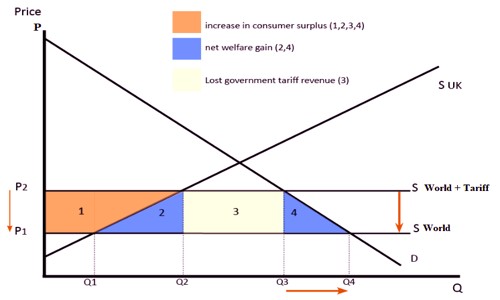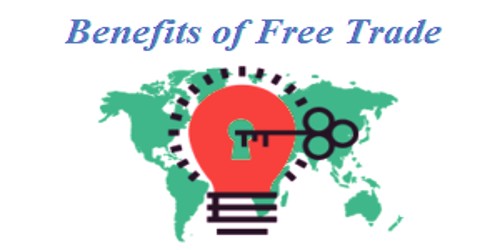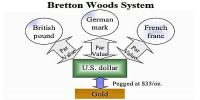Free trade is an economic theory that involves the analysis and utility of importing and exporting goods without limitation. It is a form of business strategy that allows traders to proceed and execute without intervention from the government. It allows developing countries to fill in the gaps regarding their production processes.
So, Free trade is the arrangement that things should be capable to be traded between countries with as few limitations or boundaries as potential. It offers some benefits to countries, mainly those in the emergent period.
The benefits of free trade include:
(1) The theory of comparative advantage
This explains that by specializing in goods where countries have a lower opportunity cost, there can be an increase in economic welfare for all countries. Free trade enables countries to specialize in those goods where they have a comparative advantage. A comparative advantage usually allows countries to maximize the production efficiency of their labor force.
(2) Reducing Tariff barriers leads to trade creation
Trade creation occurs when consumption switches from high-cost producers to low-cost producers.

- The removal of tariffs leads to lower prices for consumers and an increase in consumer surplus of areas 1 + 2 + 3 + 4.
- Imports will increase from Q3-Q2 to Q4-Q1.
- The government will lose tax revenue of area 3.
- Domestic firms producing this good will sell less and lose producer surplus equal to area 1.
- However, overall there will be an increase in economic welfare of 2+4 (1+2+3+4….(1+3)
- The magnitude of this increase depends upon the elasticity of supply and demand. If demand elastic consumers will have a big increase in welfare.
(3) Increased Exports
As well as benefits for consumers importing goods, firms exporting goods where the UK has a comparative advantage will also see a big improvement in economic welfare. Lower tariffs on UK exports will enable a higher quantity of exports boosting UK jobs and economic growth.
(4) Economies of Scale
If countries can specialize in certain goods they can benefit from economies of scale and lower average costs, this is especially true in industries with high fixed costs or that require high levels of investment. The benefits of economies of scale will ultimately lead to lower prices for consumers.
(5) Increased Competition
With more trade, domestic firths will face more competition from abroad, therefore, there will be more incentives to cut costs and increase efficiency. It may prevent domestic monopolies from charging too high prices. Without trade barriers, free trade decreases the market power of monopolies as they are competing at a global level. It may also prevent domestic monopolies from charging too high prices.
(6) Trade is an engine of growth
World trade has increased by an average of 7% since 1945, causing this to be one of the big contributors to economic growth. Smaller countries may need to engage in free trade to acquire economic resources for producing consumer goods or services. Free trade leads to higher economic output as an increase in demand for local goods results in higher exports. This, in turn, creates more jobs for the local economy and the country enjoys higher economic growth.
(7) Make use of surplus raw materials
Middle Eastern counties such as Qatar are very rich in reserves of oil but without trade, there would be not much benefit in having so much oil. Japan, on the other hand, has very few raw materials without a trade it would be very poor.
(8) Tariffs may encourage inefficiency
If an economy protects its domestic industry by increasing tariffs industries may not have any incentives to cut costs.















